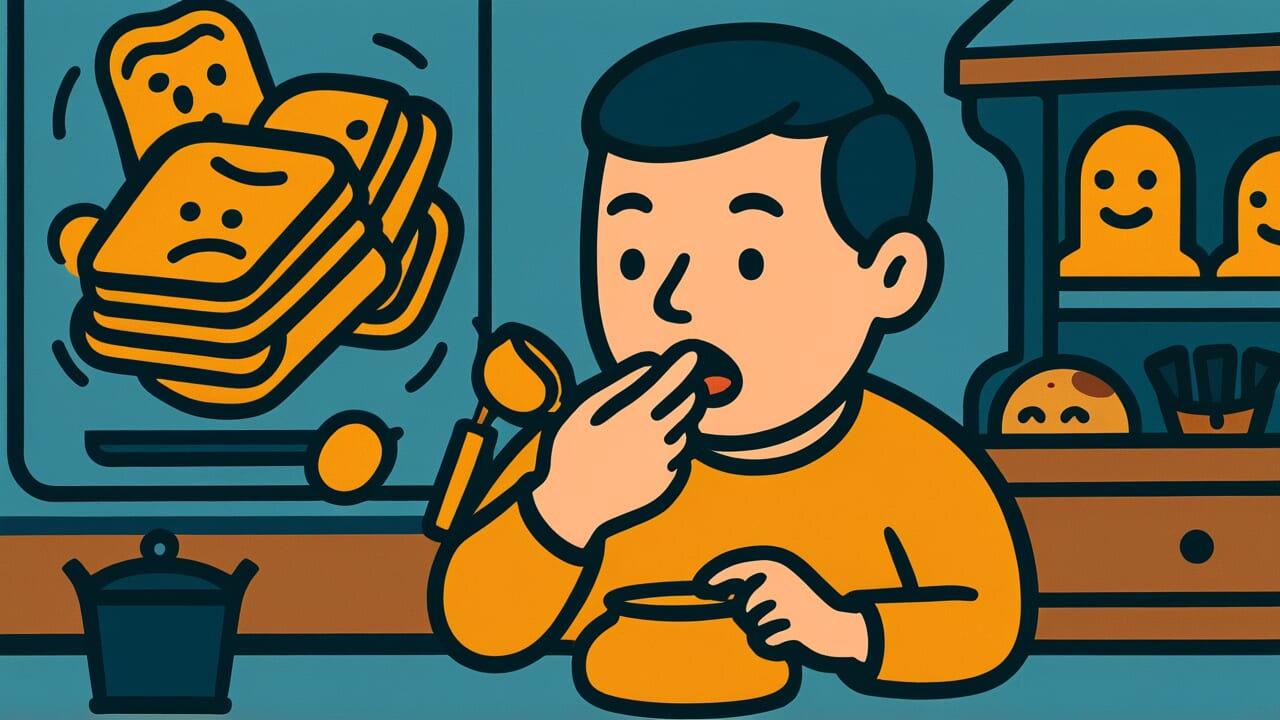How to Read “No curse comes from favorite foods”
Kōbutsu ni tatari nashi
Meaning of “No curse comes from favorite foods”
“No curse comes from favorite foods” means that the foods you love won’t harm your body. It expresses the idea that what you truly enjoy eating won’t make you sick or cause health problems, even if you eat a lot of it.
People use this proverb when they want to eat their favorite foods without hesitation. They also use it when someone is trying to avoid eating something they love.
You might say, “You don’t need to hold back so much. They say no curse comes from favorite foods.” It’s used in situations where you want to encourage enjoying what you like.
In modern times, taking this proverb literally might be difficult. However, you can understand it as the idea that enjoying your favorite foods in moderation is better for your mental and physical health than stressing yourself with strict restrictions.
The joy of eating foods you love brings mental satisfaction. This can ultimately lead to better health. The proverb shows this important connection.
Origin and Etymology
The origin of “No curse comes from favorite foods” doesn’t appear in clear historical records. However, we can make interesting observations from how the phrase is constructed.
The word “tatari” (curse) originally meant disasters brought by gods, Buddha, or spirits. Over time, people also used “tatari” to describe the harmful effects food could have on the body.
People in the Edo period viewed the relationship between food and health differently than we do today.
This proverb likely emerged from a unique Japanese way of thinking about food. People back then had practical knowledge that eating foods unsuited to your body would make you sick.
At the same time, they observed that favorite foods—foods the body naturally craves—matched well with a person’s constitution.
The word “kōbutsu” (favorite food) itself is interesting. It didn’t just mean taste preference. It also carried the meaning of something your body instinctively needs.
Before modern nutrition science developed, people had experiential wisdom. They understood that “foods your body craves are good for you.” This simple observation crystallized into a proverb.
Usage Examples
- He eats ramen every day but looks perfectly healthy. “No curse comes from favorite foods” is really true.
- They say no curse comes from favorite foods, so I eat my beloved chocolate without holding back.
Universal Wisdom
The proverb “No curse comes from favorite foods” contains deep insight about the relationship between humans and food. Why did our ancestors believe that favorite foods don’t harm the body?
The answer lies in their trust in human instinct. They had an intuitive understanding that what your body truly needs and what your heart genuinely desires must contain necessary nutrients and elements.
In an era without scientific nutrition, people maintained their health by listening to their body’s voice.
This proverb also shows human kindness—the idea of “not taking away joy.” In life, the pleasure of eating is one of our great sources of happiness.
Restricting that joy too much might actually harm your spirit. Our ancestors knew from experience that happy mealtimes eating what you love enrich the heart and give you energy to live.
Thinking even deeper, this proverb teaches the importance of “trusting yourself.” Don’t be swayed only by outside information or other people’s opinions.
Value what your body asks for and what makes your heart happy. This self-trust ultimately leads to a healthy life. That’s the universal wisdom contained here.
When AI Hears This
The human taste system isn’t just a device for judging likes and dislikes. It actually serves as a poison detector. We have about 25 types of bitter taste receptors.
This contrasts sharply with only 2 types of sweet taste receptors. Our tongues allocate overwhelming resources to avoiding poison rather than finding energy sources.
What’s interesting here is that the body develops immunological adaptation to foods you repeatedly eat as favorites. Gut bacteria change their composition in about two weeks based on eating habits.
They strengthen enzyme systems that efficiently digest specific foods. By continuing to eat favorite foods, your body builds a digestive system optimized for those foods.
In other words, favorite foods are items on your body’s certified list for safety and digestive efficiency.
Furthermore, adaptive unconsciousness statistically learns from past post-meal experiences. When the number of times you ate a food without getting sick accumulates, your brain classifies that food in the safe category.
Favorite foods are items that received high ratings in this unconscious safety database. Conversely, foods that caused food poisoning even once can trigger lifelong aversion, even if they’re actually harmless.
This is called taste aversion learning—a powerful learning mechanism that forms from just one experience.
Lessons for Today
“No curse comes from favorite foods” teaches modern people about the importance of “enjoyment” in life. In today’s society overflowing with health information, we easily get overwhelmed by what we should eat and what we should avoid.
However, this proverb offers a different perspective.
What matters is listening to your heart’s voice. Of course, eating only what you like and damaging your health defeats the purpose. But losing life’s joys through excessive restriction is also problematic.
Happy moments savoring foods you love fill your heart and create energy for tomorrow.
As a modern interpretation, this proverb teaches “the wisdom of balance.” Instead of driving yourself toward perfection, sometimes truly enjoy what you like.
This mental flexibility ultimately leads to healthy living. In your life, treasure the joy of eating. It’s not just nutritional intake—it’s the happiness of living itself.



Comments